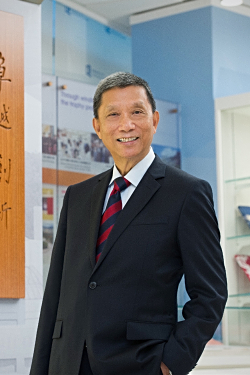Cheng Sing-yip


Mr CHENG Sing-yip
Honorary University Fellow (2018)
Mr Cheng Sing-yip has dedicated himself to the field of education ever since his graduation from The University of Hong Kong in 1966. Because of his outstanding performance in teaching, he was promoted to the position of school vice-principal in a matter of years, and later became the founding principal of Hong Kong Sze Yap Commercial and Industrial Association Wong Tai Shan Memorial College, a position which he served for 16 years. He was appointed the principal of Pui Ching Middle School, which he served for 12 years before retirement.
A veteran in the field of education, Mr Cheng has always believed in the institutionalization of school governance. He also strongly advocates the setting up of a consultation mechanism in school, continuous improvement in teaching, and the setting of clear goals and strategies for both students and teachers. All these, to him, would be important elements in ensuring high quality in teaching and learning. Mr Cheng’s contribution in the field of education has been tremendous. Besides taking up the headship of two local secondary schools, he has also been the supervisor or member of a number of school management committees covering both the main stream and special schools in Hong Kong. He was member of the Council of the Hong Kong Academy of Performing Arts, honorary treasurer of the Hong Kong Subsidized Secondary Schools Council and chairman of the Association of Hong Kong Chinese Middle Schools. During Mr Cheng’s tenure as supervisor of Hong Kong Red Cross special schools, he dedicated himself to providing a healthy school environment for the disabled and those with multiple learning disabilities, ensuring that their special needs could be addressed and learning made easier. When he was chairman of the Association of Hong Kong Chinese Middle Schools, he led all the Chinese middle schools of Hong Kong to deal with the challenges posed by the monumental change of the middle school system in Hong Kong. Until today, Mr Cheng’s service for education continues, and he still is the member of the Board of Governors of five local schools.
Besides the education sector, Mr Cheng also made spectacular contribution to the social service sector in Hong Kong. He not only dedicated himself to helping the vulnerable in society, but also made an effort to participate in public welfare helping people in various strata of society, an example of which is the promotion of free in-patient Chinese medicine consultation service for the needy. His other commitments in society in the past included: member of the Hong Kong Red Cross Council, member of the Board of Directors of the Hong Kong Baptist Hospital, chairman of the Board of Directors of the Baptist Oi Kwan Social Service, and members of the Board of Directors of Breakthrough Limited, the Hong Kong Consumer Council, the Government’s Fight Crime Committee, the Appeal Panel (Housing) of the Housing Department, and the Political Consultation Conference of the Zhanjiang Municipal Government, Guangdong province.
When he was chairman of the Committee Against Narcotics of the Sham Shui Po District, he worked diligently with various social welfare agencies in promoting educational activities against drug addiction. Mr Cheng blended education activities with community services. His active participation in, and giving his best for, public welfare brought a lot of good to the community. For all his endeavours in the education and social service sectors, he was awarded the Badge of Honour (renamed the Medal of Honour after 1997) by the Hong Kong Government and the Badge of Honour for Distinguished Service by the British Red Cross.
Mr Cheng is now member of the Board of Directors of the Hong Kong Chinese Christian Churches Union and the Hong Kong Baptist Convention, and senior member of the Hong Kong Baptist University (HKBU) Foundation. Mr Cheng’s connection with HKBU went back a long time. Since 1988, he had been member of the Council of Hong Kong Baptist College (HKBC), and member of the Court and Council of HKBU. Besides, he was chairman of the Estates Management Committee under the HKBU Council, and had also been involved in a number of other committees of the University, all in a time span of over 20 years. During these years, his contribution to the development of the Ng Tor Tai (NTT) International House and the Student Hostel project of the University is momentous.
Regarding education, Mr Cheng places equal emphasis on moral education and knowledge advancement. While stressing the importance of the former, he also believes in active learning, and helping students to unearth their potential and foster their interest in life-long learning.
Mr Cheng has been a role model in society. He always does his best in whatever role he plays and whatever position he holds. He practises HKBU’s mission—Whole Person Education—with unreserved enthusiasm. Aside from his commitment to education, he has also taken up a number of hobbies, including pursuing the knowledge of Chinese medicine, cooking and golf.
Mr Cheng has always advised students that they not only have to plan their development goals and direction, but do so with a full understanding of the present environment of both Hong Kong and the world at large. They need to look far and beyond, and be quick to grasp development opportunities. When building up their own career, they must not confine themselves to the skills and knowledge acquired from schools and colleges. They should be bold to venture into new frontiers, pursue new knowledge and foster new interests. Furthermore, they need to make good use of information from ever advancing science and technology, and follow up closely all new developments in whichever parts of the world.